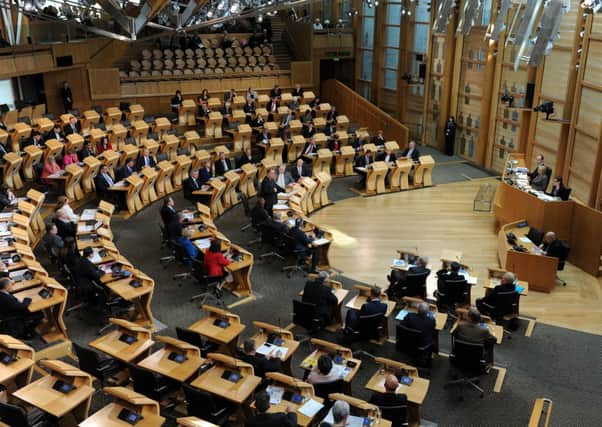Neil Cuthbert: Lobbying for confidence in lobbying


THE level of scrutiny of the Scottish Parliament and Government will reach a new high this year – for obvious reasons. Every decision made will be picked over for any hint of wrongdoing and against this background, the Scottish Parliament standards committee’s inquiry into lobbying is well-timed. Evidence was to be submitted by 10 January, so the committee’s advisers will now be analysing the different views put forward on this ever-contentious subject.
But what exactly is lobbying, described by David Cameron as the “next big scandal waiting to happen” before he became PM in 2010? At its simplest, it means attempting to influence decisions of government or parliament. A lobbyist is someone like me who does this work as a profession. In the UK as a whole, lobbying has been estimated to be an industry worth £2 billion a year.
Advertisement
Hide AdAdvertisement
Hide AdWhile the Scottish Parliament inquiry has not made headlines so far, all this might change when the committee starts taking evidence later this month. Lobbying can draw out strong opinions, particularly from seasoned campaigners for more transparency in government.
This inquiry is the first time the Scottish Parliament has considered lobbying since 2002. This followed some well-publicised issues around lobbying at the beginning of the reconvened parliament’s first session in 1999 – though Scotland has not had anything like the experience of Westminster, with allegations of impropriety made against both lobbyists and former MPs.
The standards committee is led by former minister Stewart Stevenson MSP and includes two of the newest MSPs: Cara Hilton, who won the Dunfermline by-election for Labour after the forced resignation of convicted felon Bill Walker, and Cameron Buchanan, who joined the Conservative group after the death of David McLetchie MSP. The 2011 intake is strongly represented on the committee, adding to the impression of fresh eyes looking at the issue.
The call for evidence focuses on two big questions. Firstly, the committee asks if there is indeed a problem with lobbying in Scotland. Secondly, should a register of lobbyists be set up? The scope of a register is of course open to debate, but essentially it would be designed to enable the public to see who is being lobbied and by whom.
One of the key questions MSPs have is “Have there been significant changes over the last decade in the way lobbying is carried out?’ Given that the Scottish Parliament last looked at lobbying more than ten years ago, this is very pertinent.
I suggest the biggest change is the widespread use of social media by the public and campaign groups. In 2002, social media was in its infancy – Facebook was two years away and Twitter did not launch until 2006.
Now social media is the tool of choice for campaigns and interest groups seeking to influence politicians. I have experienced first hand how single-issue campaigns use Facebook and Twitter to cajole politicians into supporting their aims. In Scotland, the new methods are particularly beloved of those fighting a wind farm in their area or seeking to prevent an unpopular local housing development going ahead. Seeing the bigger picture and backing much-needed economic development is difficult for politicians in the age of 24-hour scrutiny of Facebook posts and tweets. Every response is instantly made public through the web and the potential for a career-ending gaffe becomes greater. The danger is that less tech-savvy – but more democratically accountable – representatives of local opinion are sidelined by the online juggernaut.
The inquiry is interesting in other ways – not least the question of how the industry and its own representatives react to it. There are many in the public affairs industry who are opposed to any form of regulation and do not see the need for any increase in public scrutiny of what they do.
Advertisement
Hide AdAdvertisement
Hide AdTimes are changing, and with legislation being considered at Westminster to introduce a statutory register of lobbyists, it is a fair assumption that Holyrood will look to introduce the same level of scrutiny – if not something tougher.
And what’s wrong with that? Many private sector lobbyists are increasingly of the view that a properly-regulated industry with appropriate sanctions in place for those flouting the rules will lead to greater public awareness and trust of lobbyists and the work they do.
In 2009 a House of Commons report described lobbying as “a legitimate and necessary part of the democratic process”. The way to increase public confidence in lobbying is to recognise that and work towards an industry in Scotland that is open and accountable, with a public register of commercial lobbyists and appropriate measures for those who break the rules.
So let’s see what Stewart Stevenson and his colleagues recommend and if the Scottish Parliament will move forward with bold steps to increase public confidence in politicians and make lobbyists more transparent to the public. It would seem strange to most people if Westminster moves in this direction and Holyrood, albeit with less of a perceived problem, is left behind.
The Scottish Parliament increasingly seeks to lead the way on controversial issues rather than follow Westminster. This year, the eyes of the world will be fixed on Scotland’s MSPs as never before – so increasing public trust by regulating lobbyists is a worthy aim, which will command widespread support if parliament puts in place appropriate and proportionate measures. In this landmark year, the Scottish people deserve nothing less.
• Neil Cuthbert is director and founder of the Public Affairs Co-operative.